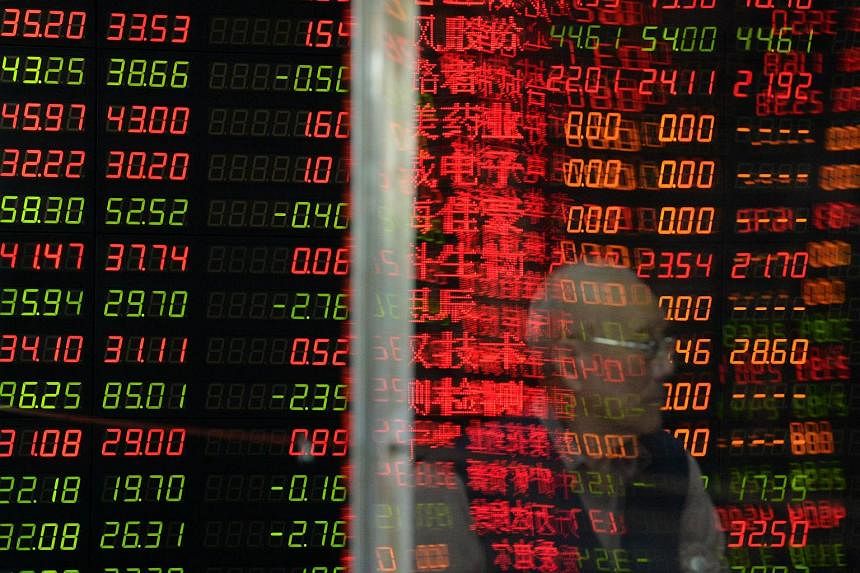HONG KONG (Bloomberg) - China's benchmark index fell, erasing the biggest intraday gain since 2008, as a fresh round of government measures to stem US$3.2 trillion of losses failed to spark gains outside the nation's largest state-run companies.
More than six stocks dropped for each one that rose on the Shanghai Composite Index, which slipped 0.6 per cent to 3,666.22 at 1:12 p.m. local time.
The benchmark gauge, which opened 7.8 per cent higher, was supported by gains in PetroChina Co. and Industrial & Commercial Bank of China Ltd., the two largest members on the index. But the ChiNext measure of smaller companies sank 7.1 percent, while the Shenzhen Composite Index tumbled 5.4 percent.
Mainland shares surged at the start of Monday trading after authorities suspended initial public offerings, brokerages pledged to buy shares and the central bank said it would provide liquidity for margin trading. The steps - which follow an interest-rate cut and reduced trading fees over the past week - have so far failed to convince investors that valuations are cheap enough with the Shanghai Composite trading 83 per cent higher than where it was a year ago.
"The market didn't buy into the measures and the downbeat mood is quite hard to change," Jimmy Zuo, a trader at Guosen Securities Co. in Shenzhen, said by phone.
At stake is the fate of a stock-market that's lured record amounts of amateur investors and grown to become the world's second-largest outside the U.S. The rally had helped Chinese firms sell record amounts of new shares to cut debt while giving consumer confidence a boost amid the weakest economic growth since 1990.
Twenty-eight companies halted their IPOs, according to filings to the nation's two exchanges Saturday. A group of 21 brokerages led by Citic Securities Co. will invest at least 120 billion yuan (S$25.95 billion) in a stock-market fund, the Securities Association of China said the same day. Executives from 25 mutual funds vowed to buy shares and hold them for at least a year, according to an industry group association.
The Shanghai Composite tumbled 29 per cent in the past three weeks on concern leveraged traders are liquidating bullish bets after equity valuations exceeded levels during the country's stock-market bubble of 2007.
The outstanding balance of margin loans on the Shanghai Stock Exchange dropped for a 10th day on Friday, sliding to 1.24 trillion yuan in the longest stretch of declines since the city's bourse began compiling the data. A five-fold surge in borrowing had helped propel the gauge to a 150 percent advance in the 12 months through June 12.
Foreigners were net sellers of 6.43 billion yuan of mainland shares through the Hong Kong-Shanghai link on Monday, the most since the programme began in November.
"The market is quite skeptical about those measures," Paul Chan, the Hong Kong-based chief investment officer for Asia ex-Japan at Invesco Ltd., said by phone. It is very difficult to stabilize a leveraged market, dominated by retail investors. I don't know how this will pan out but in near term, it's just going to expand more volatility.''

